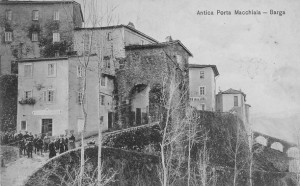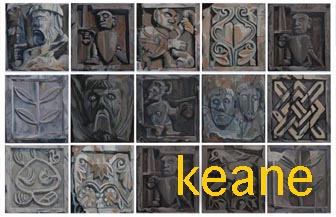Vi abbiamo parlato nello scorso articolo di quell’intitolazione, saltata all’ultimo momento, di un monumento a Pietro Raffaelli (il poeta dei fasti medicei), che doveva essere inaugurata il XX settembre 1896 e organizzata dal “vulcanico” Pietro Groppi. Ma chi era costui? Personaggio chiave delle vicende risorgimentali in Valle del Serchio era nato a Le Trine (una frazione del Comune di Barga) nel 1831; nel 1848 si trovava nel Seminario Arcivescovile di Santa Caterina a Pisa dove scriveva: “mentre stavo perfezionandomi nelle lettere italiane e latine una voce di libertà squilla nel mio petto, e acceso di patrio amore presi parte al nuovo risorgimento italiano. Dato di bando ai libri e ai dolci studi occupammi solo di affari politici e dell’arte militare dicendo che anch’io ho una patria da liberare.”
Saputo che alcuni professori stavano per partire per andare “al campo di Lombardia” cercò di unirsi a loro ma il Rettore del Seminario, informato da un delatore, impedì la sua fuga e quella di altri otto seminaristi. Ma non si diede per vinto, entrò in contatto con esponenti pisani del movimento patriottico, incontrò Vincenzo Gioberti e, tornato in Valle per un periodo di vacanza, si allenò al tiro al bersaglio.
Poi, nel 1849, si arruolò a Livorno con il corpo dei Volontari. L’esito dell’impresa fu però disastroso e per fortuna riuscì a evitare l’arresto. I suoi lo fecero tornare in seminario da dove fuggì nuovamente per andare oltreoceano, nel Nuovo Mondo.
Si stabilì a Boston dove divenne insegnante di latino in un prestigioso college. Nel 1859 aiutò a imbarcarsi i volontari che tornavano in Italia per partecipare alla guerra d’indipendenza procurando fucili e revolver per la spedizione garibaldina.
Tornò poi a Barga dove divenne ricevitore postale, agente di viaggio, aprì una locanda e una tipografia in piazza Angelio dove fondò il giornale “L’Eco del Serchio”, un foglio che raccoglieva corrispondenze da Borgo a Mozzano sino alla Garfagnana e che già nel nome faceva capire che il periodico si sarebbe rivolto ad una realtà più grande e complessa di quella del borgo dove nasceva.
“Oggi – scriveva sul primo numero del giornale datato 22 febbraio 1880 – le divisioni sono sparite, e i fratelli devono riconoscere i propri fratelli e stringersi a vicenda la mano per propugnare invece i propri interessi”. Collettore di voci e veicolo di un messaggio progressista, l’Eco era un foglio di combattimento. “Una manifestazione – come spiega il professor Umberto Sereni – di garibaldinismo in tempo di pace”.
Tante le battaglie, combattute, sin dai primi numeri, da parte di questo moderno “foglio” prima fra tutte quella per la costruzione della ferrovia che da Lucca doveva passare l’Appennino, con il benefico flusso che ne sarebbe conseguito. Sempre attento alle realtà del tempo, ampi spazi furono dedicati al fenomeno migratorio, al problema scolastico, alle condizioni igienico sanitarie.
E poi, sopratutto, il culto della Patria e la laica celebrazione dei suoi riti: Groppi e il suo giornale furono sempre in prima linea nel patrocinare, sostenere e spesso ideare tutte le commemorazioni dei protagonisti dell’epopea risorgimentale che si susseguirono in quegli anni, avviando la campagna di monumentalizzazione per il ricordo dei martiri che avevano costruito con il loro sangue “l’era novella”.
“La vita degli uomini illustri e dabbene – sosteneva – deve essere conservata e quale esempio, nell’ordine sociale promulgata.”
Groppi era ben consapevole della potenza educativa e politica del mezzo stampa, e aveva fatto suo il pensiero di Giuseppe Mazzini: “la stampa periodica è una potenza, anzi è la sola potenza dei tempi moderni. È tale per i mezzi di cui dispone e per la natura stessa del suo apostolato, perché parla e insiste, riunisce le virtù dei forti convincimenti e quella delle lunghe consuetudini, parla a tutti ed a ciascuno, alle moltitudini come all’individuo, si rivolge a tutte le classi, discute tutte le questioni, tocca tutte le corde che vibrano nell’animo umano, percorre rapidamente ed ora fissa il paese al quale volge la sua parola; lo solca, lo penetra, per così dire; diffonde uniformemente e regolarmente il suo insegnamento; raddoppia tutte le forze, è per l’intelletto ciò che il vapore è per l’industria”.
Una bella riflessione sul lavoro e l’importanza del giornalismo, quello serio. Una guida per questa nostra nuova avventura che c’è sembrato giusto iniziare nel ricordo di questo nostro grande giornalista, di questo grande uomo che ha fatto tanto per questa Valle, anche se in pochi lo ricordano.
Article by Nazareno Giusti
In our previous article, we told you about the naming—cancelled at the last moment—of a monument to Pietro Raffaelli (the poet of the Medici splendours), which was due to be inaugurated on 20 September 1896 and organised by the “volcanic” Pietro Groppi. But who was he?
A key figure in the Risorgimento events in the Serchio Valley, he was born in Le Trine (a hamlet of the Municipality of Barga) in 1831. In 1848, he was at the Archiepiscopal Seminary of Santa Caterina in Pisa, where he wrote:
“While I was perfecting my studies in Italian and Latin literature, a voice of liberty rang out in my chest, and inflamed with patriotic love, I took part in the new Italian Risorgimento. I cast aside books and gentle studies, devoting myself solely to political matters and the art of war, saying that I too have a homeland to liberate.”
Having heard that some professors were about to leave “for the Lombard front”, he tried to join them, but the Rector of the Seminary—alerted by an informant—prevented his escape along with that of eight other seminarians. But he was not discouraged: he made contact with patriots in Pisa, met Vincenzo Gioberti, and, back in the Valley for a holiday, began training in target shooting.
Then, in 1849, he enlisted in Livorno with the corps of Volunteers. The outcome of that campaign was disastrous, but fortunately he managed to avoid arrest. His family made him return to the seminary, from which he escaped once more to head overseas to the New World.
He settled in Boston, where he became a Latin teacher at a prestigious college. In 1859, he helped volunteers board ships back to Italy to take part in the War of Independence, securing rifles and revolvers for Garibaldi’s expedition.
He later returned to Barga, where he became postmaster, travel agent, and opened both an inn and a printing press in Piazza Angelio. There, he founded the newspaper L’Eco del Serchio, a paper that collected reports from Borgo a Mozzano all the way to the Garfagnana, and which, even in its name, made clear that it aimed to address a broader, more complex reality than the small town in which it was born.
“Today,” he wrote in the first issue of the newspaper dated 22 February 1880, “the divisions are gone, and brothers must recognise one another and shake hands to defend their shared interests.”
A collector of voices and a vehicle for a progressive message, L’Eco was a fighting newspaper. “An expression,” as Professor Umberto Sereni explains, “of Garibaldian spirit in peacetime.”
From its earliest editions, this modern paper took up many battles—first among them the fight for a railway line from Lucca to cross the Apennines, with all the beneficial flows that would follow. Always attentive to contemporary issues, it dedicated significant space to migration, educational problems, and sanitary conditions.
And above all, the cult of the homeland and the secular celebration of its rites: Groppi and his newspaper were always at the forefront in promoting, supporting, and often initiating commemorations of the Risorgimento’s heroes—launching the campaign of monument-building to honour the martyrs who had built the “new era” with their blood.
“The lives of illustrious and good men,” he argued, “must be preserved and, as examples, made known in the social order.”
Groppi was well aware of the educational and political power of the press, and he embraced the thinking of Giuseppe Mazzini:
“The periodical press is a power—indeed, it is the only true power of modern times. It is such for the means it possesses and for the very nature of its mission: because it speaks and insists, it brings together the virtues of deep conviction and those of long habit; it speaks to all and to each, to the multitudes and to the individual, it addresses all classes, discusses all issues, touches all the strings that vibrate in the human soul, it travels quickly and, for a moment, fixes its gaze on the land it addresses; it ploughs through it, it penetrates it, so to speak; it spreads its teaching evenly and consistently; it doubles all forces; it is for the intellect what steam is for industry.”
A beautiful reflection on the work and importance of serious journalism. A guide for this new adventure of ours, which seemed fitting to begin in memory of this great journalist of ours—this great man who did so much for this valley, even if few remember him today.
Article by Nazareno Giusti








